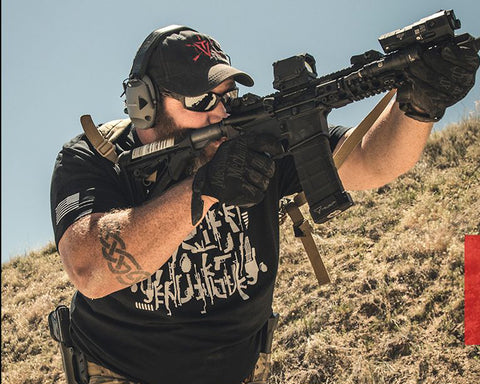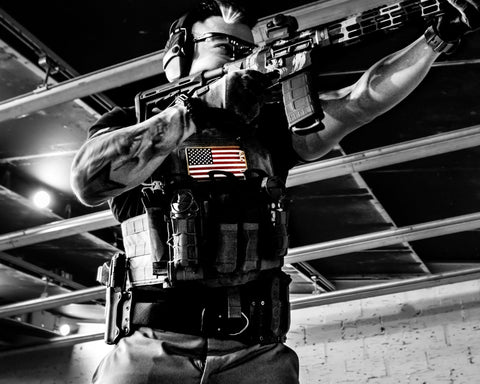Suppressor baffles, also known as silencer baffles, are a crucial component in the design of firearm suppressors.
The suppressor baffles are the part of the suppressor that reduces the noise and are typically made from materials such as aluminum, stainless steel, or titanium.
The design of the suppressor baffles is critical to the suppressor’s overall performance, and many different designs have been developed over the years.

In this blog, we will look closer at suppressor baffle design and explore the factors that go into creating a high-performing suppressor.
Best Suppressor Baffle Design
There are many different suppressor designs on the market, each with unique pros and cons. However, two designs stand out as particularly effective at reducing noise and muzzle flash.
One of those designs is the stacked baffle design, which is characterized by a series of shaped baffles stacked inside the suppressor tube.
These baffles redirect the expanding gases produced when the gun is fired, causing them to slow down and cool before they exit the suppressor. This results in a significant reduction in noise and muzzle flash.
Another popular suppressor design is the Monocore design. This design features a single, solid core that runs the length of the suppressor. The core is typically made from stainless steel or titanium and works by trapping and redirecting the expanding gases.
This design is known for its effectiveness in reducing noise and its ability to withstand high volumes of fire. Additionally, the monocore design is easy to clean and maintain.
Let’s take a closer look at monocore vs stacked baffles.
Stacked Baffles
Stacked baffles are made up of metal plates or baffles arranged in a specific pattern inside the suppressor tube.
The purpose of the baffles is to slow down and cool the hot gases expelled from the firearm’s muzzle when fired.
The design and alignment of the baffle stack are critical for the suppressor to function effectively. The baffles must be perfectly aligned to prevent strikes and securely fit together to maintain alignment.
Stacked baffles require more precision, materials, and effort during manufacturing.
Monocore Baffles
Suppressors with a monocore design are milled out of a single piece of metal. Because the core is a single piece, suppressors with this core type are generally much easier to service and clean.
Some say that monocore designs have a louder first-round pop, but that’s an outdated notion. Maxim Defense uses a new monocore design that eliminates the first-round pop.
Monocore is the strongest design out of all the options. The monocore is a key piece to the strength of this design. The front-loading monocore makes maintenance super easy. Every time the user shoots, when they are done shooting, they just spin the core out and put it back in.
As long as they do that it will never carbon freeze and lock up like all .22 suppressors are prone to do. Once the monocore is out of the tube, its design is conducive to easy cleaning if the user wants to scrub it with a nylon brush and some solvent.
Maxim Defense Monocore Suppressor Design
Three design features stood out as we spoke with the guys who were involved in the development of these suppressors.

First, they are user-serviceable, meaning that you can disassemble and clean the suppressor without having any specialized tools or having to send it to Maxim Defense.
If the core itself becomes compromised from a bullet strike, all you have to do is remove it from the tube and send that part to Maxim. There is no need to send in the serialized part and deal with the red tape of replacing it.
Second, the suppressor tube has an integrated carbon scraper. As you unscrew and pull the tube from the core, it scrapes any excess carbon from the internal core of the suppressor.
Third, with some other suppressors on the market, after running a lot of rounds through them, the threads tend to lock up and you cannot remove the suppressor from the gun.
Maxim Defense has invested time in its thread design to ensure the suppressor stays secured to the weapon at all times. When the time comes to remove it, it will unthread with minimal effort.
Other benefits to Maxim Defense’s monocore design? As Maxim Defense explores other materials to maximize the performance of the monocore baffle design, you’ll be able to take advantage of those without any ATF paperwork.
Since the mount is the serialized part of the suppressor, you can replace/upgrade the monocore core without any additional paperwork or waiting. Just order the core and get it shipped to your doorstep. Additionally, if you get any baffle strikes or the tube itself gets damaged, you can get replacements without engaging the ATF.
Which suppressor baffle design is most efficient?
The most efficient suppressor design is generally made of 100% titanium.
Titanium is an ideal suppressor material because it’s lightweight and performs better than steel or aluminium at cooling hot muzzle gases.
Additionally, Titanium makes for a quieter suppressor which leads us to the next question.
What is the quietest suppressor baffle design?
As seen in the following video, they discuss the old-school hush puppy project originally developed for the Navy SEALs back in the mid-1960s. Arguably one of the quietest suppressors around. The baffle design used in this suppressor was a monocore.
Enter the Maxim Defense monocore baffle design. They’ve taken things to the next level with a combination of materials, baffle geometry, and its unique three-piece design. Their design is proven to significantly reduce, if not eliminate, the first round pop.
First round pop is defined by the volume of the first round fired minus the average of the volume of the remaining rounds fired.
In a typical case, the first round fired is much louder than the other rounds that you would fire. There are several contributing factors to first round pop. First and foremost; before the first round is fired, the suppressor is full of oxygen-rich atmosphere.
This oxygen encourages a secondary detonation inside the suppressor as unburnt and burning gunpowder enters the suppressor. After the first round is fired, the suppressor is immediately full of carbon dioxide instead of oxygen.
There are other causes of first round pop, but this is the most common. It should be noted that because one of the lesser factors is pressure, different loads of the same cartridge can have an effect.
Maxim Defense 22 suppressors, for the most part, are designed to negate or at a minimum, significantly reduce first round pop. The internal geometry of the suppressor baffles is what tends to increase or decrease first round pop.
When Maxim Defense designed its monocore, it went to great lengths to find the right combination of entrance chamber volume and baffle geometry (fluid resistance).
It’s DSX-D and PRS line of suppressors have an integrated M baffle in the entrance chamber that significantly reduces or negates entirely all first round pop.
Its line of 22 suppressors does not have an integrated M baffle, as they do not need it. The baffle geometry that they designed worked perfectly on its own. For the .22, it all came down to a mathematically and geometrically optimized monocore.
Conclusion
Suppressor baffle design plays a critical role in the effectiveness of a firearm suppressor.
The arrangement and alignment of the baffles are crucial for slowing down and cooling the hot gases expelled from the muzzle, reducing the noise generated by the firearm.
High-quality materials, such as Titanium, are also essential to ensure that the suppressor can withstand the heat and pressure generated.








Leave a Reply
Your email address will not be published. Required fields are marked *